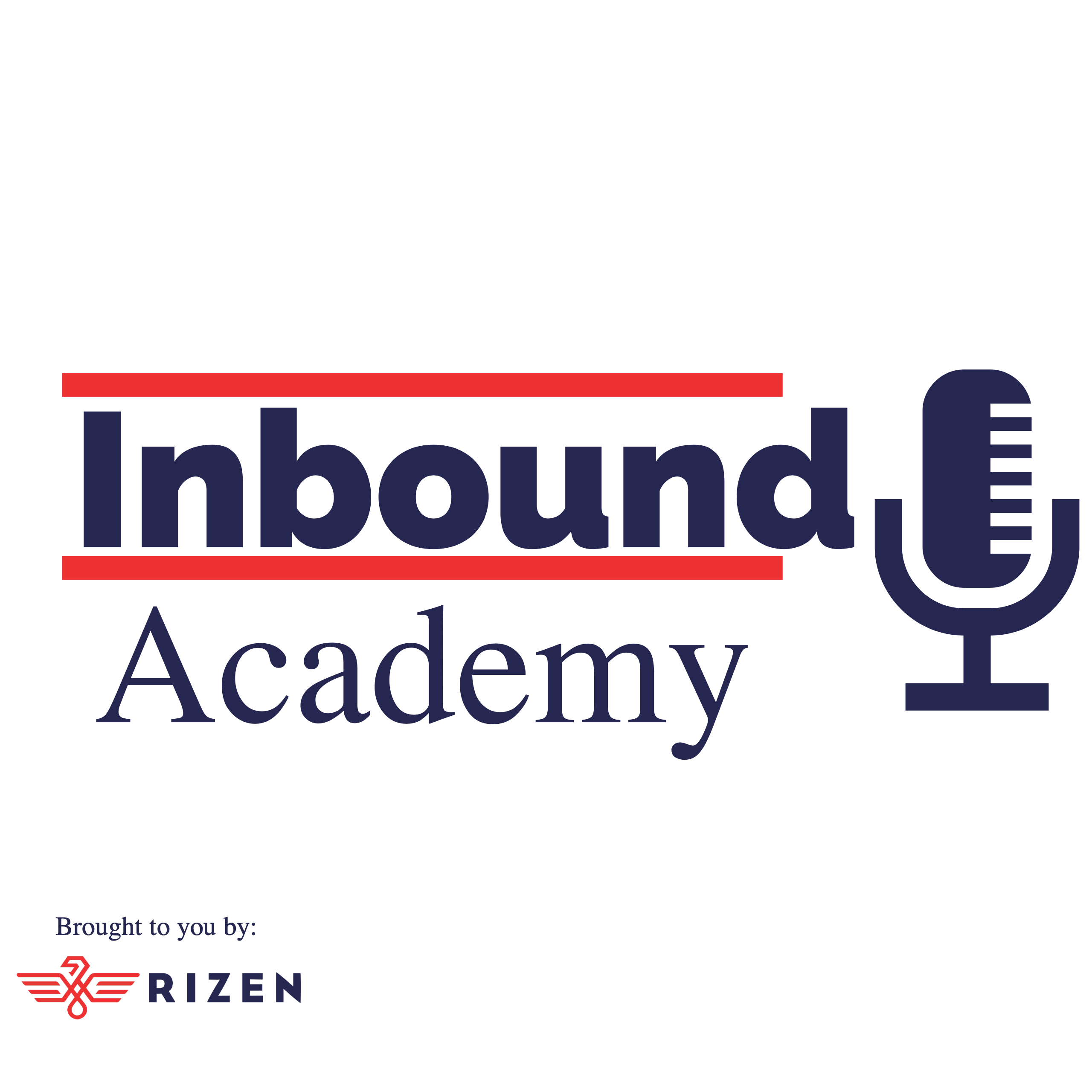Today on Inbound Academy we’re talking about the process of how "Joe Six-Pack" or "Jan Baker’s Dozen" goes from being interested in your product to actually buying it. It’s a journey - the buyer’s journey - and you need to be their guide the entire way. We’ll talk about how best to do that...next!
Episode Transcript
Jeff Lambert: 00:00 Today on Rizen Academy, we're talking about the process of how "Joe Six-Pack or "Jan Baker's Dozen" goes from being interested in your product to actually buying it. It's a journey, the buyer's journey, and you need to be their guide the entire way. We'll talk about how best to do that next.
Jeff Lambert: 00:30 Hello and welcome to the show today, everybody. I'm Jeff Lambert, I'm your host and I'm all alone today. Just me and my dog, "Inbound." I call her that because I never have to chase her. She always comes to me. Good dog. So today we're going to be talking about the buyer's journey. This is a process that lays out the basic path every customer takes from becoming an interested prospect to turning into a repeat customer. And it's important to understand each step of that journey because each customer needs to be reached differently depending on their stage of the journey.
Jeff Lambert: 01:12 You gotta think about this journey as you prepare your content. This blog post is designed for which type of customer. What about this video or podcast or infographic as an example? This podcast is purely for people who are in the awareness stage and that's intentional, but we'll explain more about that in a minute. So the buyer's journey is a three step process every customer goes through according to the inbound philosophy. Let's break these down. The first step in the buyer's journey is known as the awareness stage. At the beginning of your buyer's journey, your prospect, the person interested in your product is most likely unaware of two different things. A, they're unaware of your company, and B, they're unaware of the fact that they have a need. See, at this stage, buyers are grappling with the following question. How do I know if I'm interested, if I don't even know that you exist? See, as a marketer, you need to figure out during the stage how you can create awareness of your product, service, or company. So the buyers begin to understand what you do and how you can help them. Content made for the awareness stage should be focused on your buyers' pain points, not your product or brand. Your job is to put your brand out there and show how it can solve a problem that a customer is having and is beginning to search for an answer for. Yeah.
Jeff Lambert: 03:03 You need to establish yourself as a knowledgeable, trustworthy individual in that field. So that's the awareness stage and that's what you should do to reach customers in the awareness stage. Now, as a potential customer realizes you exist and starts to consume your content to figure out how they can solve the problem that they're having. They move into the next stage of the buyer's journey called the consideration stage.
Jeff Lambert: 03:35 So once buyers have done their research and they've narrowed their choices down to just a few companies that they feel they can trust, they're going to return to that research stage in the awareness stage. Again, they're going to start all over. In a sense, they're going to go back and look at these companies that they narrowed down to and again, start looking at the content that you've put out there to figure out which one is most knowledgeable in this space. Now, according to Pardot, they have a state of demand generation report that they put out and it showed that 70% of buyers returned to Google at least two to three times during the course of their research. And they dive even deeper into each company specific offerings to see how they can address their particular pain points. It's a cyclical thing and we have to cater to that as companies in order to attract companies, uh, customers, excuse me.
Jeff Lambert: 04:31 So when you're creating content for the consideration stage, you want to be able to speak more authoritatively on your topic. Think about trying to reach the manager or the CEO or someone who's making the buying decision. You can be less informal during the stage and you can drop those marketing friendly phases like creative new approach or cutting-edge technology. This is the stage where you want to focus on the big picture, like increasing revenue or measuring return on investment for companies because as they make their final decision, that's what they're going to be looking for. And that brings us to the final stage in the buyer's journey. Remember there's three steps. They started off at the awareness stage looking for an answer to a problem they have and maybe not even realizing that you existed. Then moving to the consideration stage where they've narrowed down companies they trust based on the content that they've consumed and they're going through that research process again to make a final decision.
Jeff Lambert: 05:36 Now once they've gone to those two stages, they're going to move to the third stage, which is known as the decision stage. Now in the decision stage, it's exactly what it sounds like. These potential customers are ready to make a purchase. They've gone through whatever levels of management they need to to get permission to get this ball rolling and they're starting to think about, you know, preparing and implementing this new product or service that you're offering, and what the startup costs are going to be the customer support associated with it. All those final items that are going to determine which solution best fits their needs and their budget. And remember they've spent days, weeks, months, even sometimes years of research and your buyers are ready to select that vendor. So now it's time for them to start picking one, doing paperwork and going through the setup process.
Speaker 1: 06:33 That means that you've won. You've got them, they're ready to start moving forward with you. But just because your buyers have made a purchase, that doesn't mean that your work is over. See, most buyers are going to continue to research best practices for this new investment they just made. They're going to look for implementation guides and they want to make sure that they're ready to hit the ground running with this new tool that they're putting their hard earned money on. So you need to make sure that you're developing content that also not only caters to potential customers, but to come up customers that you've already closed with. Are you providing them resources to be able to get the most out of what they've purchased from you? And that's really important because by doing that, you're setting them up to be satisfied. Return customers or evangelists of your product. They're going to tell everybody else in their industry or people that they're connected with. What a great service you provide that you helped them all the way through to be able to make this purchase. And you can send you continued to support them as they already made the purchase and implemented the product.
Speaker 1: 07:41 Now you're using the inbound methodology and the buyer's journey is a part of that. And remember, what are the great things about inbound is its flexibility. You can personalize your sales process to the buyers journey just by understanding where they're at. So keep in mind, as you create content, are you covering all stages of the journey? Is your content speaking to those people? And if you see gaps in those areas, try and focus on developing more content, better quality content to be able to help people in each stage. Well, thank you for joining us today, everybody. Remember, you can expect the new episode every week, day, always no longer than 10 minutes and always filled with the advice that's going to help you grow your business. And remember, if you're looking for an experienced, friendly and results driven team to help you with some marketing needs, check out, risen by going to go [inaudible] dot com you can also follow them on Facebook, Instagram, Twitter, and Linkedin by searching for the username risen inbound. That's one word, risen inbound. We'll see you next episode and thanks again for joining us.
Want to stay in the know?
Join us, and get all the podcasts and more straight to your inbox.



.jpg?length=600&name=045%20-%20YouTube%20Cover%20Art%20(Video).jpg)


No Comments Yet
Let us know what you think